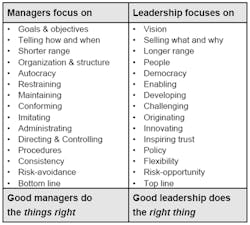There are always great discussions regarding what makes a good leader. There are some things that are constant and some that are different, each person having their personal stamp on it. I want to share my insights from my long-lived journey into leadership. Below are my starting suggestions or basic traits.
First, most ask about training. Seeking training is always a positive step, there is a cottage industry built to support new leaders. Yes, many of these programs and courses are great but very expensive. Training alone will not create anyone into a great leader, it sharpens the edge; but being placed in the job hardens the metal. Not all departments have the budget to send every officer off to leadership training, so it often lands upon the individual to prepare themselves for the future.
Be a constant learner - At no time does a good leader cease developing. You should treat every day as a new learning experience. Great leaders never stop learning and seek out new, innovative ways to improve themselves. Never, ever stop learning!
Read – the biggest thing here is finding time to read. It matters not to me what your read – science fiction, novels, history; all are good for expanding your thought processes. When you recreationally read, you take today’s pressures away and allow your mind a brief vacation, if you will. Then your return to the day’s events will be fresher and maybe a new viewpoint to work with. Reading will also reinforce or offer you another way of broaching a problem. Historical views on how others have faced adversity or change will give you insights to prepare your projects. Great leaders encourage their staffs to read as well. There is nothing wrong with a staff member reading professional centered articles/products on duty to enhance staff knowledge. Share your library or reading lists! I do not like the supervisor who throws a book down on the desk for a reading assignment. Offer or suggest but mandatory reading seems grade school to me. Post reading discussions open up the doors to great conversations and real-world applications.
Written communication – I have never seen a great leader who could not pen a great inspirational note. Note writing, along with penmanship has nearly disappeared. The electronic media has replaced the personal note with e-mail. Take time to write a note, in my eyes it is far more impactful than an e-message. Make it special to the receiver, for this was not generated by administrative support but from the writer. I use a fountain pen which by virtue of the ink flow forces me to slow down and make the script legible and thoughtful. Old school ways still work at times.
Encourage communication within the entire department, create an atmosphere of exchange for thoughts. No chief will ever fully understand a neighborhood problem from their office. The youngest patrol officer who rides that call for service has valuable insights on the real issues with solutions. Those closest to the problem will have answers, seek insights from all to achieve performance. Be accessible for those to come in and discuss, good communication can be stymied by an appointment or closed door.
Prepared – Without getting into General George S. Patton’s orders for command staff, you are the first in before the mission starts and probably the last one to turn the lights out. Preparation is a fine art, you never are caught flatfooted. The old US Calvary motif was to ‘take care of your horses that got you here first, then your troops and yourself last’. If you are a successful leader, your staff will get you there- care for them first and foremost! At the lunchroom, you are the last in line, the chief eats last.
Punctual – I was taught that it is better to be an hour early than a minute late. If you call the meeting, you are there! The message you send by your late (but fashionable) arrival sends the wrong message. If you hold others accountable to be on time, then you should be the standard of punctuality.
Planning – Great leaders are great planners, most even prepare their succession planning. Planning is essential and more so in today’s world. Once the event starts, all plans are usually worthless, for nothing in life follows the script. However, the truism is your logistical planning is what prepares your staff to face the event with all their needs fulfilled. Your contingency plans prevent failure, not every plan follows ‘plan A’ or ‘plan B’. Contingency planning will ensure success. Safety is paramount in your planning cycle. We are in a dangerous business to start with, do not complicate without a safety review. Every plan or initiative will have the financial or budgetary implications, they also need to have a safety statement. Your staff is your greatest asset, protect them through safety planning.
Mentors and trainer – Please remember you too were once a rookie. It is important to train your staff and prepare them to be successful. Stop and think, who was your mentor or role model? Then follow their path, how would they handle this issue? Did they take the time to invest in you, pass it on! On the other hand, who did you despise as a leader and recall what they did? Then you have a balance, that person not to emulate. Learn from your mistakes and share your success, so others will not relive your mistakes – we all learn together.
Understand the problem or situation first, then you can be understood when the orders are given. It is more than listening, but you hear and observe the conversation.
Praise in public and chastise in private – Constant praise can be overlooked, but never forget to praise for extraordinary performances! Never chastise a subordinate in front of their peers or citizens. Be private, criticize with direction towards improvement. Be professional in your direction, always end on a positive tone.
Never carry a grudge, a small person can carry a big grudge. It takes a bigger person to forgive and drive on past the pettiness. You have enough on your plate, you don’t need these leftovers to taint the morning’s tasks.
Accept and admit to mistakes - If you mess up – ‘fess up! Own up to your mistakes and make them an opportunity for all to learn from and become the advantage over the next time. Your accountability for your decisions speaks volumes for your image as a leader.
You are the face of the organization – be the example for all to work and live by. Matters not how shiny your fleet, how technologically advanced the department becomes. When the chief or sheriff is under scrutiny, all of the agency suffers. Do not forget that the most important person in the agency is the next officer about to answer a call for service. This officer is the one that sets the stage for how your service delivery is evaluated. A department’s image is earned and maintained with each new contact. Your officers are the ones that deliver the quality service you ask of them. You chief, are the one that ensures that this officer is properly trained, equipped, cared for and motivated to make that standard of service performance and excellence to continue. Chief, it is not all about you.
Finally, your word is your bond. Keep promises and be the truth. Liars never will become good leaders. More so, in today’s world we need honesty in all that we do, if you tell the truth the first time and every time, you will never have to remember what you have said or done in the past.

William L. Harvey | Chief
William L. "Bill" Harvey is a U.S. Army Military Police Corps veteran. He has a BA in criminology from St. Leo University and is a graduate of the Southern Police Institute of the University of Louisville (103rd AOC). Harvey served for over 23 years with the Savannah (GA) Police Department in field operations, investigations and completed his career as the director of training. Served as the chief of police of the Lebanon City Police Dept (PA) for over seven years and then ten years as Chief of Police for the Ephrata Police Dept (PA). In retirement he continues to publish for professional periodicals and train.



